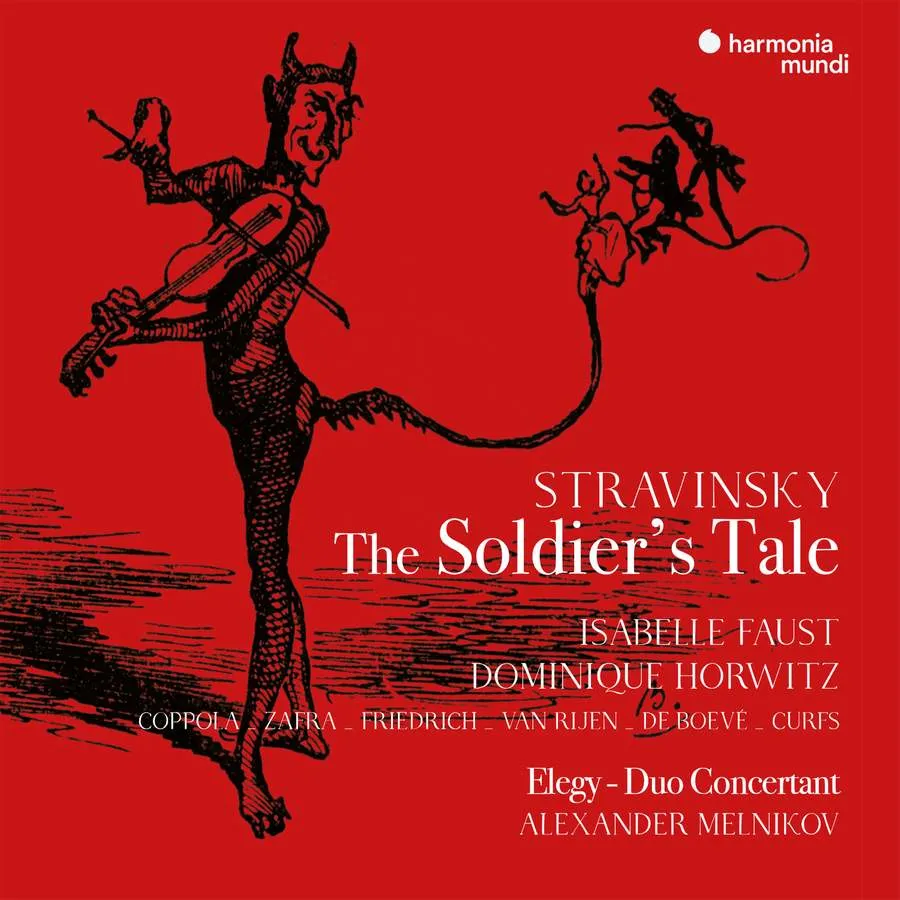
Stravinsky The Soldier’s Tale*; Duo Concertant^; Elegy Isabelle Faust (violin), ^Alexander Melnikov (piano), *Lorenzo Coppola (clarinet), *Javier Zafra (bassoon), *Reinhold Friedrich (cornet), *Jörgen van Rijen (trombone), *Wies de Boevé (double bass), *Raymond Curfs (percussion) *Dominique Horwitz (narrator) Harmonia Mundi HMM992671 71:27 mins
Any project with which that phenomenal violinist Isabelle Faust is involved has to be of the highest musical and imaginative quality. This one is special on many counts, starting with the Stravinsky programme, which leads us from the little-known Elegy for muted violin or viola of 1944, a very personal start, via the lilts and flares of the enigmatic but miraculous Duo Concertant to the full Soldier’s Tale.
It takes a great actor to engage us throughout the disproportionate amount of text; though Stravinsky’s music is so often incidental, it has compelling thematic links effortlessly highlighted here, but Ramuz’s dramaturgy usually feels unwieldy. So much depends on the narrator in the early stages, where there is infinitely more talk than music. So it’s a relief to find French actor Dominique Horwitz, who has recorded his threefold part – he impersonates the Devil and the Soldier too – for three separate Harmonia Mundi editions in French, German and English. The work seemed transformed to me when I first heard the classic Markevitch recording with Jean Cocteau narrating and here, too, I prefer the French edition, where obviously Horwitz is most at home. But much as one fears for the irritation of vowel distortion as our narrator spies the soldier coming down the ‘reaud’, one soon grows accustomed to such minor idiosyncrasies.
The Devil’s voice is horrible but apt, like a cracked violin veering between falsetto and lower register. Horwitz’s preface claims that his companions’ choice of period instruments is bound to make the music sound more abrasive. But instead it’s rounded, intensely vocal, intimate, incredibly sophisticated – not the usual, but very welcome, as if the whole thing were an ethereal fairytale. Certainly the Spanish inflections come through far more than usual in the Royal March and parts of the dances which follow (where the music finally takes over). Faust dovetails beautifully with her colleagues, and some of the fast articulation in the drumming is really breathtaking.
The Duo Concertant is a far more substantial work than I realised before I heard Alina Ibragimova and Samson Tsoy perform it in a weekend of blindingly beautiful music at the Ragged Music Festival in London’s East End. Not many violinists could equal Ibragimova for steely intelligence in this elusive music, but Faust is absolutely one of them, and she’s joined by her regular chamber music partner Alexander Melnikov, very much a match for her in the mercurial and mysterious aspects of the work. There are connections to the worlds of the ballet Apollo and the Violin Concerto, especially in the second ‘Eclogue’, but when the featherlight ‘Gigue’ gives way to the final ‘Dithyramb’, we’re transported into another world – that movement alone is a monumental masterpiece.
Overall presentation is stylish, as always with Harmonia Mundi, and I love the photos of the period instruments with comments from the players. It’s your choice which language version you invest in, but don’t miss the musical wonders.
David Nice
